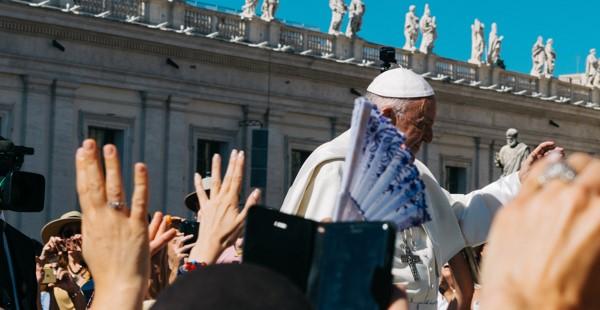Why has Pope Francis chosen to adopt the model of leadership that is already beginning to characterise his papacy? James Hanvey SJ identifies three particular aspects of the Franciscan and Ignatian traditions that seem to be informing the new Pope’s vision of mission.
Dear Pope Francis, I think you are a humble man. When you read this letter you will have washed the feet of other kids like [me]. I am writing this letter because you give me hope. I know one day with people like you us kids won’t be given sentences that will keep us in prison for the rest of our lives. I pray for you. Don’t forget us.
(Letter to Pope Francis from a young boy participating in the Jesuit Restorative Justice Initiative in a juvenile detention centre in Los Angeles)
When Jorge Mario Cardinal Bergoglio SJ emerged onto the balcony as Pope Francis, asking the people gathered in St Peter’s Square to bless him, there was a refreshing sense that something was different. His humility was evident immediately, and in the weeks since his election it has become increasingly clear that his public persona is not just part of a subtle strategy to lure us into a more sympathetic acceptance of papal and hierarchical authority; it has the character of something that is deep, interior and sincere, and it speaks to atheists and believers alike.
Even if we are still in a ‘honeymoon’ period, Francis’ impact on the Church, and especially our understanding and experience of the papacy, looks set to be very significant. Whatever struggles and disappointments lie ahead, genuine humility does not get stale. Francis himself may not be fully aware of how the Holy Spirit will inspire others through him but, just as he has done to the juveniles at the LA detention centre, he gives us hope.
Already Francis has created a fresh ecclesial climate which includes a new way of modelling leadership. He has begun to deconstruct the monarchical model of papacy and the increasingly rococo affectations that surrounded it. Both Franciscan and Ignatian ways of leading are uncomfortable with such things. If leadership is congruent with the values it professes to support, then it has freshness; it is attractive and, somehow, it allows us to imagine how we might also act in ways that are congruent and true. Genuine humility, focused on the needs and service of the other, has a freedom to change, adapt and take risks, to step out beyond the usual zones of safety and comfort. It does not worry about image or ego. Leadership which lives from compassion is not weakness, nor is it indecisive; it is another sort of generous strength. Even so, if we are not to mistake its attractiveness for a transient novelty, we need to ask about its sources: how might Francis of Assisi and Ignatius of Loyola inform this papacy and what resources do they offer the one who carries its responsibilities? I think we can identify three particular influences: an emphasis on recovering interiority, Franciscan love and Ignatian wisdom.
Interiority
St Francis and St Ignatius made Christ the primary source of their lives. Though called in different centuries with different challenges and cultures, they both understood that only in him could answers be found, creative energies released and new ways envisaged. Both are charismatic innovators: they show us how Christ is not a restriction or a limitation but an adventure for every age. Christ sets us free from the captivities of will, intellect and imagination because he remains the Truth by which we can take our bearings in the constant movement of history: this is the Truth, forever generative, that sets us free. Together, Francis and Ignatius show us that our primary responsibility is to him and faithfulness to his way alone, which makes visible new paths through the impasses that each age has to face. They teach us that if imitatio is not mere surface performance, it has to be rooted in an intimate, daily, personal friendship with Christ and service of those whom Christ loves. They illuminate the corporal and spiritual works of mercy as enactments of the Beatitudes, quietly radical acts which challenge all that imprisons the spirit or degrades human dignity. Although both great saints were men of action, they grasped the primacy of the interior life as the condition of its fruitfulness.
This is something Pope Francis always returns to in his homilies and talks. It is not just a call to piety, but a profound challenge to our frenetic culture which evacuates our interiority and wearies the soul. Constantly surfing our life, we can never possess it. If we are spiritually homeless then we are vulnerable to exploitation under the illusory promise of autonomy. Defending and developing our interiority is not only our act of resistance, it is reclaiming our freedom. St Ignatius and St Francis show us that the interior sanctuary of our life is not an empty space but a personal presence – ‘make your home in me as I make mine in you.’ To find this place and sustain it takes time; it takes faithfulness and a rhythm of life. Pope Francis invites us to discover this interior place, where our souls are nourished and our minds refreshed, from which we can go out into the world.
Franciscan love
Francis of Assisi is attractive not just because of his humility and poverty, but because these values make him so accessible; they place him at the service of all living things. St Francis is so in touch with the immensity of the love that flows from the Crucified Christ – its mercy, forgiveness and understanding – that in his person, words and deeds, he makes that love tangible for us. The fact that he understands himself to be the one who needs this love the most means that he never places himself above us, whatever our condition: no matter how poor we are, or degraded we may feel, he shows us that the love of the Crucified Christ is never ashamed to serve us, to restore our dignity. By his own life, St Francis shows us how such a gift of love comes without any complications: God’s love is totally innocent; it restores our innocence in receiving it. Such a gift never humiliates or diminishes us but treats us with infinite ‘courtesy’ as Julian of Norwich would put it. Il poverello helps us to understand that in the presence of such love all we can do, all we need to do, is simply receive it. He shows us that ‘the love which moves the sun and the stars’ must also move us beyond all the laws of nature to reach out to the unloved, the contaminated and despised, anointing them with the dignity of Christ. This is love at its most gracious.
With Francis of Assisi we encounter a new humanism – not a return to our natural or even self-constructed state, but a humanism of the life of grace. He understood that only in self-forgetting service and abandonment to God’s care does our dependence, our nakedness, become a magnificent freedom to be open. This is why the love of the Crucified Christ placed Francis in a new personal relationship not only with women and men, but with all creation. The world ceases to be a place that we master and abuse; it becomes our home, our ‘sister, mother earth’, to be cherished, preserved and healed. When we live in this deep humility and grateful poverty before all created things, the violence of our primal alienation and the insatiable destructiveness of our desire to conquer and master creation are overcome. But Francis was no proto-romantic, he was an apostle: the birds of the air, the fish in the sea and the trees of the forests also have a right to hear the gospel preached through our caring actions and persevering reverence.
One senses that Pope Francis understands that his namesake does not write a theology of the Crucified Christ, he performs it. When the Pope washed the feet of young prisoners, including a Muslim woman, did we not see the Franciscan inspiration in action? Although some found it shocking, what the Pope was doing was giving us a glimpse of the magnitude and scandalous freedom of the Crucified Christ who washes daily the feet of everyone who bears his image.
Ignatian wisdom
Ignatius absorbed much from St Francis of Assisi and although there are obvious differences between them, there is much that converges. We expect that as a former Jesuit novice master and Provincial, the Holy Father is well aware of this. Like St Francis, St Ignatius is committed to the Crucified Christ, but he also has a sense of the Resurrected Christ, the consoler, who calls us to join him in his mission from the Father. This is why, at the heart of Ignatian spirituality, the question of our freedom is made explicit: how are to use it in the service of Christ and his Church? How can we come to a truly apostolic and ecclesial freedom? This is where the wisdom of discernment comes into play.
Discernment is not some technique for making good decisions; there are plenty of textbooks about how to do that. What Ignatius offers is not only method but wisdom. Although discernment needs all the natural practices of experience, judgement and reflection, it also needs something else: not just the intellectual but the affective and spiritual sense of how God is ‘labouring and working’ in ‘people, places, times and circumstances’, to use a phrase from the Jesuit Constitutions. For all his attention to our self-knowledge and desires, Ignatius is theo-centric not ‘ego’- or ‘me’-centric. Only in this way can we be servants of God’s kingdom and not our own. As a theocentric practice, discernment is a graced seeking – almost an aesthetic sense – for the movements of God’s salvific action present in all our relational dynamics: formal and informal, personal or institutional, wherever our passive, receptive and active agency is in play. Freedom is our obedience to the ‘gravitational force’ and pattern of God’s grace at work. It is our desire to co-operate, to make the choices which try to secure the more universal good and resist the false values which distort or damage that good. It is an operational wisdom that comes from knowing to whom we belong, where our heart really lies. It asks us to be attentive to the movement of the Spirit, both in the world and in ourselves, especially to be alert to whatever makes us deaf or distorts.
At the centre of the Spiritual Exercises, Ignatius places a special exercise which helps us clarify our understanding, develop our attentiveness and purify our freedom to choose. It is called The Meditation on the Two Standards – Las Dos Banderas. It is a way of coming to see who or what we are really serving: the values of this world with their illusions of security, reputation and power; or the values of the Crucified Christ and his way of working, in humility, obscurity, apparent powerlessness. In the Two Standards, Ignatius captures the fundamental drama of our freedom, what is at stake in our choices, which the eternal call of the Crucified and Risen Christ within history activates and illuminates: the presence of his mission for the kingdom in our existence and history.
Creating new spaces
The Christ who meets us in St Francis and St Ignatius does not offer us a strategy for improvement or a programme for success. He offers us himself. Only that intimate, personal relationship with him makes sense of the choices which the wisdom of the world judges as total foolishness. Both Francis and Ignatius agree that only a total love can make sense of trusting a crucified God.
Pope Francis has laid claim to these two great spiritual masters of the Catholic Church. As his papacy unfolds he will certainly need both wisdom and love if he is to preserve the Church in faithful mission and in consolation. Already, however, he has begun to open up new possibilities, new spaces where consolation may be found. I think it is possible to suggest two of these spaces:
Memory and Truth: We know Pope Francis comes from a world of political upheaval, division and torture, haunted by the memory of ‘The Disappeared’. He comes to the papacy knowing the shadows that cast their darkness over the Church, whether in the US, Europe or Latin America. Yet he has spoken simply and eloquently of God’s untiring mercy and the ministry of reconciliation which comes in humility and love, in justice and in truth. He now has the opportunity to remind us of the Christ that calls us to this way, this ‘Standard’ which begins in the Church itself and flows out to a suffering world. If the Pope can somehow encourage, initiate or affirm that movement for justice, truth and reconciliation within Argentina, it has every hope of bearing fruit through Latin America and the rest of the world, in the Church and in secular society.
A New Transcendence: Speaking in the meetings before the conclave, Cardinal Bergoglio cited the last pages of Henri De Lubac’s meditation, The Splendour of the Church. He identified the danger of a Church trapped in a ‘spiritual worldliness.’ This is a self-referential Church, refusing to go beyond itself. We might observe that one of the dangers of this Church is its preoccupation with the recovery of transcendence which it believes it can produce through a pseudo-elevated sacred language, or a liturgy which confuses the aesthetic of silence, reverence and prayer with the manufactured mystique of worldly majesty that only colonises the sacred while pretending to defend it.
Francis and Ignatius lived by a different transcendence: transcendence of self and of the narcissistic seductions of control, power and success. It is the transcendence of following a crucified Christ, whose glory is in self-giving service of the despised and rejected. This transcendence creates a new space of redemption beyond the vacuous re-enchantments of the false prophets. It is an open space of honest, personal, intimate encounter. It begins in trusting the other, offering a hospitality which is not only physical but intellectual and spiritual, going out to meet them with generosity, treating them with dignity and simplicity. It looks into a human face, not an abstraction or an ideology; it seeks to listen and understand before judging. It knows that it must seek forgiveness before it offers to forgive. These are the spaces where the Holy Spirit is quietly at work and the Church is reborn.
James Hanvey SJ holds the Lo Schiavo Chair in Catholic Social Thought at the University of San Francisco.






